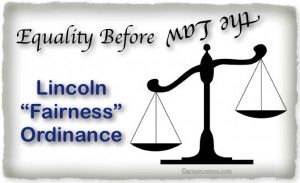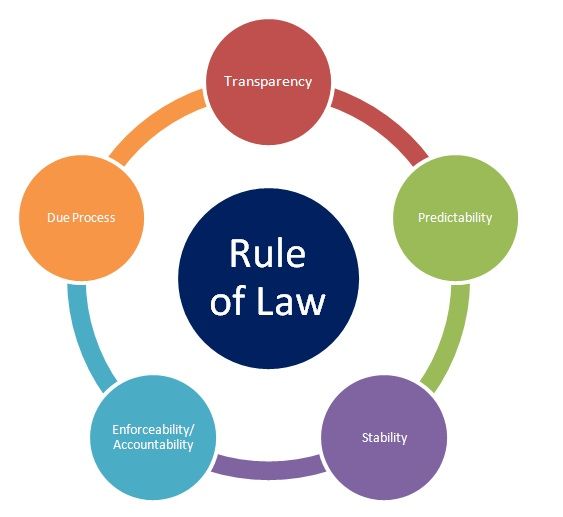Editor’s Note: This article was originally written as a submission to the Lincoln Journal Star as a Letter to the Editor, but was not accepted due to that newspaper’s policy of a 45 day moratorium on publishing such submissions. The Journal Star published the Local View column, jointly written by Linda and Shelli, “Governor needs to use LB599 veto to draw a line”, on April 13, 2012. The version published here only differs from the one submitted to the Journal Star in that it is a bit longer; Linda was able to expand a few of her points since we do not have the same space constraints here.
A great deal has been said in the pages of the Lincoln Journal Star and elsewhere about the Lincoln City Council’s decision to expand the definition of protected classes within the Municipal Code to include sexuality and gender identity. Readers may support or oppose the ordinance for any number of reasons. It is a great mistake, however, to say that the process by which the City Council amended this city ordinance does not matter. It matters a great deal. In fact, the process is arguably of more lasting importance to each and every citizen of Lincoln than the immediate result is to those who seek recognition of self-described LGBT persons as a new protected class within the city and beyond.
Our system of government at every level is based upon the rule of law. Rule of law means that everyone, including public officials, are subject to the law and must obey it. In addition, as F. A. Hayek put it, rule of law “means that a government in all its actions is bound by rules fixed and announced beforehand — rules which make it possible to foresee with fair certainty how the authority will use its coercive powers in given circumstances, and to plan one’s individual affairs on the basis of this knowledge.”1
The rule of law is responsible for three aspects of our government that Americans tend to take for granted. First, rule of law limits the power of government to act in an arbitrary manner or otherwise abuse its power. In so doing and in the long run, rule of law makes government more rational and its policies more intelligible. Second, rule of law ensures equality before the law. Finally, rule of law results in procedural justice, essentially the “due process” provided for under the Fifth and Fourteenth Amendments to our U.S. Constitution.
With their May 14th vote, the Lincoln City Council willfully subverted the rule of law. Lincoln is governed by a home rule charter, and, therefore, is independent of state law with respect to strictly local matters. But, as to matters of state concern, state law prevails over provisions of the city’s charter. In this respect, a city’s charter and its ordinances function in relation to state government similar to the way state constitutions and statutes function within our federal constitutional system.
Lincoln’s Charter enumerates the powers of the City Council, expressly describing and limiting what the Council can and cannot control through legislation. Article X, Section 1, of the City Charter does not give the Council the power to legislate with respect to LGBT persons or to add them as a protected class under the Municipal Code. In order for the City to obtain that power, it is necessary for city officials to seek amendment of the Charter. That requires a vote of the people.
But under state law, civil rights are not strictly a local matter. The state has a system of statutes already in place that defines what is and what is not a protected class. Sexuality and gender identity are not included within that definition. In fact, they are expressly excluded from coverage by the Nebraska Fair Employment Practices Act. Because state law trumps any conflicting provisions contained in a city charter, it is a virtual certainty that, even if Lincoln’s charter amendment was approved by a vote of the people, the amendment would still be invalid because of its variance from state law regarding what is, and what is not, a protected class under state law.
 In sum, by voting to amend the Lincoln Municipal Code’s civil rights provisions to create protection for LGBT persons, the Council exercised a power it does not have under its own Charter and, at the same time, enacted an ordinance which conflicts with current state law regarding the matter in question. The rule of law is turned on its head. Five Council members seized a power refused them by the people rather than appeal to the people for permission to act. This is both arbitrary and an abuse of governmental authority. As a result, one group of people have been favored with preferential treatment by the Council, and the regular and established hierarchy of governmental authority between the city and the state has been violated.
In sum, by voting to amend the Lincoln Municipal Code’s civil rights provisions to create protection for LGBT persons, the Council exercised a power it does not have under its own Charter and, at the same time, enacted an ordinance which conflicts with current state law regarding the matter in question. The rule of law is turned on its head. Five Council members seized a power refused them by the people rather than appeal to the people for permission to act. This is both arbitrary and an abuse of governmental authority. As a result, one group of people have been favored with preferential treatment by the Council, and the regular and established hierarchy of governmental authority between the city and the state has been violated.
And what are the arguments marshaled in defense of this intentional disregard of rule of law, a concept which is so vitally fundamental to our legal system? To reduce the justification offered by everyone from our Mayor to the editorial staff of the local paper to one succinct statement, they contend this is the right thing — indeed, the moral thing — to do and, therefore, a vote of the people is not required. The newspaper’s editorial actually went so far as to say:
“The Journal Star believes it is not incumbent upon elected representatives to put matters of right and wrong up to a communitywide vote.”
Seriously? This from progressives who routinely dismiss social issues from the political sphere — at least, those with which they disagree (e.g., abortion) — as impossible attempts to “legislate morality”? The very same progressives who contend that personal character doesn’t matter in the selection and retention of our elected officials now argue that our representative republican form of government empowers those very same officials to determine what is morally right and morally wrong on our behalf? Neat trick, that. I think it’s called talking out of both sides of one’s mouth.
As I read the editorial opinion and the so-called news reports published in the Lincoln Journal Star supporting the Council’s action, I was reminded of two pop culture references which may help to carry my argument better than further written words at this point. The first is a song by Stories, a band that was something of a one or two-hit wonder when I was in high school. The title of the number was If it Feels Good, Do It, and it seems to me to summarize the City Council’s smug and superior attitude regarding this ordinance, their authority, and the rule of law generally. Have a listen and see what you think:
The second is a comment made by Star Wars’ Senator Padme Amidala as she watched Palpatine “elected” emperor of the soon-to-be former Republic by acclamation, “So this is how liberty dies . . . with thunderous applause.”
Email subscribers, click HERE to visit the site and watch the included videos.
Rule of Law flow chart found at Coalition for the Rule of Law: “About Us, Objectives”
“Equality Before the Law (turned on its head): Lincoln ‘Fairness’ Ordinance” GiN original graphic with “scales of Justice” image found at EQ Consulting
- This quote is from Hayek’s Road to Serfdom, a book that is well worth the read. ↩

You must be logged in to post a comment.